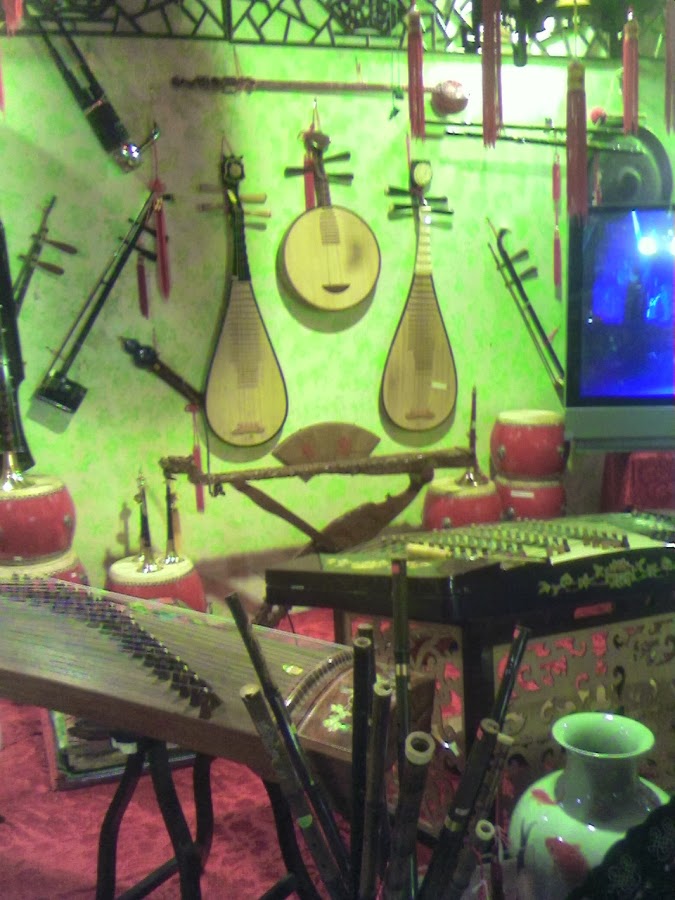Click here to access the Resource Center (for all other "Erlangen 91052" posts).
One year ago on Round and Square (15 February 2013)—China's Lunar Calendar 2013 02-15
Two years ago on Round and Square (15 February 2012)—Seinfeld Ethnography: Newman's Rage
 |
| [a] Learnin' RF |
 |
| [b] Concatenation RF |
It was the annual New Year's Gala at the Konfuzius Institut, and it was my first.
I had afternoon errands to run at the bank, and then the post office, but I arrived at the Erlangen Bahnhoff in plenty of time to purchase my ticket to Nuremberg. I made it up to Platform 3 before the 17:14 departure. From there, it was a smooth, twenty-four minute trip to the heart of big-city south-central Germany—the town with a lock on the area's museums, of which the German Railway Museum (this one) is hardly the biggest attraction.
For one shining night in February, though (and on that calendrical concatenation of Valentine's Day and Lantern Festival), the DB Museum brought China and Germany together in one frenzied, speechified, musical spectacle of drinking (Coca Cola), holding hands, and singing we are the world. The only difference was that the musical quality was several notches higher, with vocals from Turandot and an erhu performance that teased more power from a pair of strings than I have ever heard in my life. And how can you beat a lively string quartet (streichquartet) finishing it all up with Ouvertüre zum Frühlingsfest (春節序曲—Spring Festival Overture)?
 |
| [c] Instruments of power |
Now that's "cultural contact."
So far, I have left out the biggest part of the program, however. The speeches packed a powerful Germanic punch, and I learned a thing or two about the qualities that make a speech fit the occasion. They were good. The challenge lay in their being seven of them. Count 'em: eins, zwei, drei, vier, fünf, sechs, sieben...and then music (and only after that, food and drinks). Seven speeches, all in German (with the exception of the General Counsel of the PRC in Munich, who had a few lines of Mandarin)...had whole swaths of the audience thinking about other things.
I saw it as an opportunity to see how much my linguistic net could catch at this early transitional stage from my college German (and a little reading in my field of study over the years). The experiment was a success; I learned that I have...a lot to learn. Still, it goes further. Have you ever found yourself in a situation in which you know the linguistic expectations are going to bury you—that you are about to be at the bottom of a dump truck pile of foreign verbiage? Well, I have (and was there again tonight). Seven speeches (by a combination of government officials, academic administrators, and mayors). Seven.
 |
| [d] Instrumentation RF |
And yet (and yet)...I have learned to get what I can from these "opportunities."
Moreover, they were quite good, and I say that with sincerity.
But back to the dump truck of language. I often joke (but I am only partly "joking") that linguistically superior people are, in almost every case, better at tolerating a staggering level of incomprehension than are "normal" people. Over the years, they have learned to be patient and to soak in scores of utterances as completely as possible, getting what they can out of every clear word, social cue, or chance detail that they understand.
It reminds me of the New Yorker cartoon of a woman talking to her dog. This is how I remember it: "Blah, blah, blah, blah, blah, blah, Rover, blah, blah, blah, blah, blah, good doggy! Here is a Gary Larson version of the theme that makes the same point.
In many ways, this has been the story of my foreign-study life (strings of "blahs" and an occasional "Rover," "Ginger" or "good doggy").
 |
| [e] Listening...learning RF |
Let me go further, by telling a little story of a day when I was sitting in the busy office of the "Japan Study" program at Waseda University in Tokyo. American students in the program came and went, picking up their mail, stopping to chat, and so forth. The office was a part of a much larger office center, with busy workers doing the administrative legwork of the university's international studies bureaucracy.
In walked a Japanese office assistant. She began speaking to me in Japanese (this often happens...in Japan). I began to listen (this is what I have learned to do, and I only emphasize that because of what came next). Before a full sentence had been uttered, one of the American students waved her hands in the air and fairly yelled "WE DON'T UNDERSTAND!"
I have thought about that a good deal over the years, and it has become a lesson in reverse for me. Now I try to throw myself into situations where I have to hang on for dear life, as we say back home. This is not hard to do when one's language skills are as poor as my German ones. Still, I have learned a good deal about language as a total communicative act rather than just phonemes and syntax. This happens when you can't rely on only words and grammar to carry you. I have also (and this is the point of today's post) found that I can understand a whole lot more if I just relax and throw open wide the doors of full listening.
I wonder what would happen if we all started to do just that, even in our native languages?
I might even buy the world a Co
 |
| [f] No "blahs" here RF |
Tuesday, 18 February 2014
Tchaikovsky's Violin Concerto in D
I'm in love with three virtuosos, and have a newfound respect for this piece. What does that have to do with Germany? A lot. You'll see.
No comments:
Post a Comment